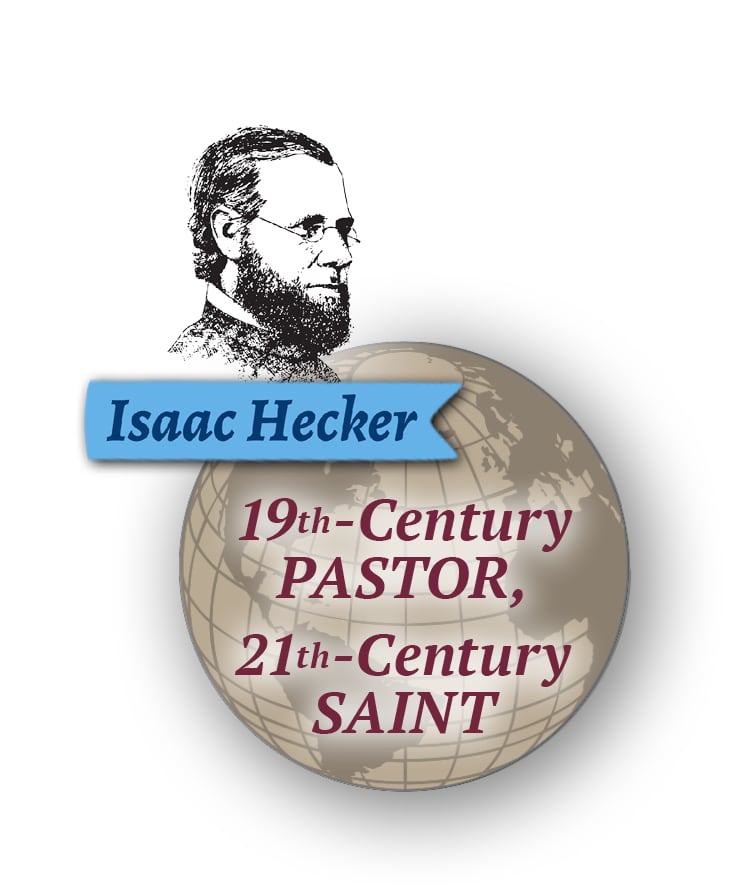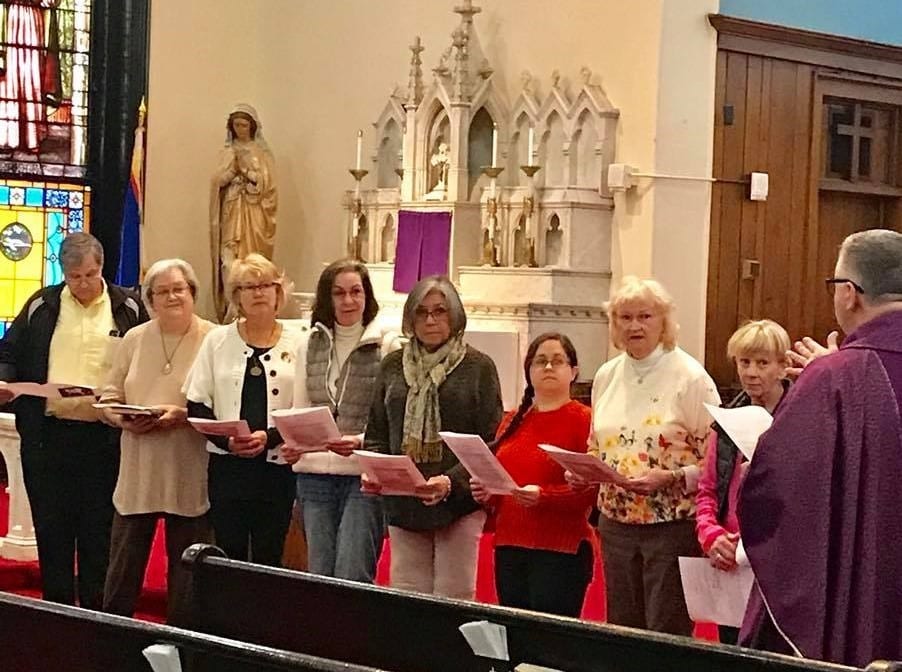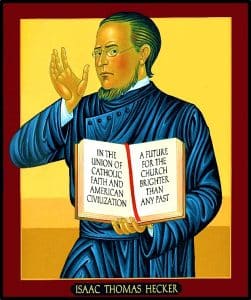November 1, 2021
- Who is that masked Paulist Associate?
- Book Review: Paul, A New Covenant Jew: Rethinking Pauline Theology
- Question Box
- Tell us about your life as an Associate
- Paulist Pilgrimages: The splendors of Eastern Europe: Budapest, Prague, Vienna, & Oberammergau
- Paulist Pilgrimages: 500-Year Anniversary Ignatian Pilgrimage to Rome
- Hecker’s spiritual search involved deep thought
- Proposed Program for November
- Contacts
- Paulist Associates Promise
- Prayer for the Intercession of Fr. Isaac T. Hecker
By Erin Cordle, Columbus Associate

Having grown up in a small farming village in Ohio, I learned that an important family value is to be fiercely protective of each other and our neighbors. As our family grows, it’s amazing to see new clan members adopt this same “I would fight to my death for you” attitude.
Good example: My niece’s husband. He always has been a protector. However, he has become a ninja warrior as they now are expecting their first child.
My brother is the bulldog protector of our family. He also is a world-renowned immunologist with 40+ years’ experience. He explains that eventually we all will be vaccinated either by choice from highly effective vaccines or as a result of contacting COVID or one of the variants with a significant possibility of lasting negative health effects and/or death. He describes this pandemic as a Darwinian event that for the first time is being determined by intellectual choice not natural selection. He believes we are playing with fire and knows that the longer we wait to stop this pandemic the more difficult that will be as the mutations will become more and more deadly. I believe him. I wear a mask.

“The best sermon on Christianity is a Christian” (Hecker Diary, May 3, 1843; PV, p.247). Masks may seem inconvenient; yet, for me as a Catholic Christian, wearing a mask is a small cross to bear and a sign of my care for the other. I feel wearing a mask will protect those around me – not just me. “Amen, I say to you, whatever you did for one of these least brothers of mine, you did for me” (Matthew 25:40). I wear a mask.

At my diocesan office, we all wear masks in the building – vaccinated or not – as we are open to the public. We wear masks to protect our coworkers, their families, and our visitors from any germs we might carry and unknowingly spread.“Divine love is infinitely active, and, when it has entered the human heart and has set it on fire, it pushes one to outward perfection and visible justice” (Hecker, 1886, The Church and the Age, p.162; PV, p.250). As Catholics, we are invited to embrace small realities that can lead to lasting change. As Saint Teresa of Calcutta has been quoted many times, “We can do no great things, only small things with great love.” I wear a mask.
Today I’m not knowingly being asked to literally fight to the death for anyone; however, I am being asked to make small gestures so I don’t put anyone in harm’s way. Although neither glamorous nor convenient, it is an invitation to evangelize by actions that show Christ’s love and the Holy Spirit working through me. I wear a mask.
Erin Cordle is Associate Director of the Columbus Diocesan Office for Social Concerns.

reviewed by Charles B. Jones, Jr., Paulist Associate – Knoxville, Tennessee
The authors of Paul, A New Covenant Jew: Rethinking Pauline Theology offer a thorough and comprehensive exegesis at answering the centuries old question, “what kind of Jew was Paul?” They relate through the six chapters on: apocalyptic; Christology; atonement; justification; and the Last Supper. Much is drawn from Paul’s own self-description found in his writings.

Although there are numerous books on Paul, this is a deep and unique approach using three different authors with their own specialized focus. The book is appealing for an in-depth study of Paul for Catholics as well as others. However, it remains faithful to Catholic scholarship throughout. The text describes continuity between Paul and Jewish faith and discontinuity and how Paul cast the Jewish world of the day.
The first Part of the book presents the question of what kind of Jew was Paul, a former Jew, eschatological Jew or Torah-observant Jew. They propose he is a “new covenant Jew”. They then develop Pauline themes in the following chapters and take note that Paul’s thought was about two ages and that the new age had already begun for Jews and Gentiles. For Catholics, the chapter that might evoke the most discussion is the Last Supper.
The book is highly recommended for individual or a group study.
Charles B. Jones, Jr. is a Paulist Associate in Knoxville, Tennessee
We would welcome your book suggestions and – even more – your book reviews on what you or your group have read. Please contact Richard at [email protected] to share your recommendations and submit a short review.
This is the first of our monthly “Question Box” series in which we ask you to reply to a question in about 50 words. You can send your replies to [email protected] by the 15th of the month. They should be about 50 (or fewer) words. We’ve hoping to get several responses to each question and to publish them in the following issue.
Since November begins with All Saints Day, this month’s question is:
Do you have a favorite saint? What makes that particular saint your favorite?
From the Paulist Associates Handbook:
“Paulist Associates find opportunities in their daily lives, through their various vocations, to exemplify the mission commitments of the Paulists in the charism of Fr. Isaac Hecker. His charism specified that, in modern American/Canadian culture, the Holy Spirit was at work, making it conducive to invite people to faith, and helping the Church understand its role in modern, democratic societies. His charism was marked by openness to others and a particular welcome to outsiders.”
In the months ahead, we’d like to ask you to share ways in which you live that model in your daily lives, in your families, in your parishes or schools…any way that you bring the Paulist charism to the wider world.
Submissions of any length are welcome. And pictures are a great addition.
Email them to Denis Hurley at [email protected].
Thank you.
— Denis Hurley, Editor
ALMOST SOLD OUT – FOUR PLACES LEFT!
The splendors of Eastern Europe: Budapest, Prague, Vienna, & Oberammergau
September 17-September 27, 2022
$3799 from New York
An 11-day pilgrimage with Paulist Fr. Thomas A. Kane on an unforgettable pilgrimage to Eastern Europe. See the once-a-decade performance of the world-famous Oberammergau passion play and explore the breathtaking cities of Budapest, Prague, and Vienna.
This summer we will host a Special Pilgrimage in the spirit of St. Ignatius, designed by Fr. Thomas A. Kane, CSP, for Paulist Pilgrimages with Fr. Julio Giulietti, SJ, our spiritual director. For five hundred years Christians have found in Ignatius’ Spiritual Exercises a trusted companion for personal faith, spiritual development, and a source of spiritual depth. Our pilgrimage celebrates Ignatius, inviting pilgrims to engage fully in the Spiritual Exercises and deepen their relationship with Christ.
Ignatius in Rome has been offered for small groups many times over the years for pilgrims who have interest in St. Ignatius, are fascinated by the Eternal City, and find Rome a deeply prayerful place.
Our focus is mainly on Ignatian sites, including prayerful visits to the Churches of Ignatius in Rome, a journey to La Storta, a public audience with Pope Francis (if and when available), and an optional tour of the Vatican Museum. There will be daily talks on the dynamics of the Spiritual Exercises and Jesuit history in the very places where Ignatius walked, lived, and directed the early Society of Jesus.
By Fr. Ronald Franco, C.S.P.

The following selection is from the preliminary lengthy presentation of the case for Isaac Hecker’s sainthood. Further segments of the document will be published in future issues of Associates World.
Meanwhile, those interested can read the statement in its entirety at paulist.org/hecker21
Like Christian history’s most famous seeker, Saint Augustine, Hecker had examined the leading intellectual and religious currents of his time, paying intense attention to his own inner spiritual sensibility, before finally finding a permanent home in the Roman Catholic Church. In our contemporary idiom, Hecker was “spiritual but not religious” for much of the first 25 years of his life.

What was significant about Hecker’s “spiritual but not religious” period, however, was that he did not remain that way. For Hecker, seeking was never an end in itself. The point of seeking was finding. Once the object was found, the search ended. Having found fulfillment in the Catholic Church, he never desired to look farther.
Rather, he desired to devote his life to helping others – especially other seekers, such as he himself had been – to find the truth in the Catholic Church. Hecker’s enthusiasm for his new faith and his commitment to the Church would permeate all his subsequent activities – from his initial conversion experience as recorded in his Diary, through his active ministry as a priest and missionary preacher, to his final mature exposition in his last book, The Church and the Age.
Fundamental to this first stage of his life was his recognition of the indwelling Holy Spirit of God acting to call him out of himself and into the Church. “Hecker’s own intense internal experience” had taught him “that the origin and goal of all dimensions of life was personal union with God,” and he “converted to Catholicism because he believed that the Church was the place where that purpose was and could be accomplished.” The sanctity specifically characteristic of this first period found expression in this conscious recognition of God’s providential presence and providential action in his life and his personal submission to the presence and providential action of the Holy Spirit.
Reflecting upon his experience many years later, Hecker wrote that he “not only became a most firm believer in the mysteries of the Christian religion, but a priest and a religious, hopes thus to die.”
Submitted as a group project of the Knoxville Associates with Charles Jones as Project Manager

Breathe in me,
O Holy Spirit, that my thoughts may be holy.
Act in me,
O Holy Spirit, that my work too may be holy. Draw my heart, O Holy Spirit, that I love what is holy.
Strengthen me,
O Holy Spirit, to defend all that is holy. Guard me, then, O Holy Spirit, that I may always be Holy.
Amen
St. Augustine

Introduction
As Paulist Associates, we are familiar with the journey Fr. Hecker made: from conversion to Catholicism, becoming a priest and later forming the Paulist Fathers. This study will compare and contrast between Fr. Hecker and St. Paul, who lived over 1,800 years earlier.
Five Movements
Comparing St. Paul and Fr. Hecker, five significant movements can be discerned:
Culture — St. Paul relished Roman citizenship, which permitted him to move more freely in his world. In his mission, he traveled to different communities, but not without opposition. Fr. Hecker faced his own opposition as he navigated American and Catholic culture in his own day. Hecker understood classical Americanism, filled with economic freedom, civil liberties, free markets and cultural liberties. This was unlike European Catholicism, where ultramontanism (the authority of the Papacy was exercised over Church and temporal affairs) was in vogue. This began to change first in Belgium and then with the French Revolution. Additionally, conservative Catholicism opposed Fr. Hecker and his understanding that the Church model of Europe would not work in America, and had to be changed to fit the culture and reach believers and non-believers. (Hecker had been accused of subjectivism and crypto-Protestantism by a French cleric, and conservatives had voiced concern of incorporating immigrants into the Church.)

Vision – St. Paul experienced a spiritual awakening and call from the Risen Christ on the road to Damascus. Similarly, Fr. Hecker had several mystical experiences that reached its fulfillment in Hecker’s dream to convert all of America to Catholicism. A person of mystical piety, he responded to this call. But throughout his life and especially in his later years, he struggled, as do many holy leaders, with feeling useless and that God had abandoned him.
Mission – St. Paul was called to mission over a vast area, and traveled to growing Christian communities facing numerous obstacles spreading and defending the faith. Fr. Hecker, a consummate preacher, spoke before thousands of people throughout his lifetime. Sometimes his audience contained believers and non-believers who converted; other times, as many as two-thirds of his audience were made up of non-believers or non-Catholics.
Evangelization – St. Paul understood evangelization; he sought to reach across cultures geographically, and to reach non-believers and frail Christian communities. Fr. Hecker, much like Pope Pius XI and later Bishop Fulton Sheen, understood how to use media to spread his message to the masses effectively by print and traveling lectures. Americanism was popular culture in the era of Fr. Hecker, and to reach persons it required meeting persons where they were, and going to them, much like Christ sought those on the fringes. This message is timeless and just as important today where Pope Francis issued Evangelii Gaudium—inflaming the hearts of the faithful; outreach to the Baptized not living up to their commitments; and evangelization to those not knowing Jesus Christ. This resonates with what both St. Paul and Fr. Hecker espoused.

Holy Spirit – St. Paul was deeply aware of the gift of the Holy Spirit to the Church, and the Spirit’s role as the Third Person of the Trinity, dwelling with the people day by day. Fr. Hecker’s spirituality clearly understood this in his own life and his mystical sense. Fr. Hecker thought that the world could be transformed by being attentive to the movement of the Holy Spirit, each being called differently.
Summary
As Paulist Associates, we often experience quotes and read about Fr. Hecker. There are many parallels between Fr. Hecker and St. Paul, and examining the spirituality they share can help us deepen our own faith. Our call as Associates is to evangelize, and to be inspired by the Holy Spirit as both Fr. Hecker and St. Paul modeled for us.
1. In today’s world, how can we evangelize to those from a different culture, to those on the fringe, and to those with weakened faith? What lessons can we take from Fr. Hecker and St. Paul in this call?
2. How do you see the Holy Spirit moving in the Church and your community today? What is the Spirit calling us to do?
3. Reflect on a moment of vision and spiritual awakening from the Holy Spirit. How did your life change? Share if you feel called to do so.
4. How are you being called? What “tools” do you need to live out this mission as“Paulist Associates”?

A Prayer to the Apostle Paul:
Come Glorious St. Paul,
most zealous apostle,
martyr for the love of Christ,
give us a deep faith,
a steadfast hope,
a burning love for our Lord,
so that we can proclaim with You,
“It is no longer I who live,
but Christ who lives in me.”
Help us to become apostles,
serving the Church with a pure heart,
witnesses to her truth and beauty
amidst the darkness of our days.
With you we praise God our Father.
“To him be the glory, in the Church and in Christ,
now and forever.”
Amen
(From Jubilee Year of the Apostle Paul,
A Bible Study Guide for Catholics, pg. 95)
PAULIST ASSOCIATES NATIONAL DIRECTOR
- Mike Kallock, C.S.P.
Paulist General Office, P.O. Box 20606, New York, NY 10023, [email protected]
BOARD MEMBERS
- David Rooney, Diaspora Group, [email protected]
- Mary Sullivan, Boston, MA, [email protected]
- Richard Allegra, Diaspora Group, [email protected]
- Heather McClory, Toronto, Canada, [email protected]
- Fr. Frank Desiderio, C.S.P., [email protected]
- Fr. Joe Scott, C.S.P., [email protected]
ASSOCIATES WORLD STAFF
- Publisher: Fr. Mike Kallock, C.S.P.
- Editor: Denis M. Hurley
- Design Coordinator: Ellie Murphy
- Staff Writer: Richard Allegra

Look upon us this day, with compassion and hope. Hear our prayer. We ask that through the intercession of Father Hecker your servant, you might grant us (state the request).
We ask this in the name of Jesus Christ, Your Son, Our Lord, who lives and reigns with You and the Holy Spirit. One God, forever and ever. Amen.
When you pray this prayer, and if you believe that you have received any favors through Hecker’s intercession, please contact the Office of the Cause for Canonization of Servant of God, Isaac Hecker at [email protected]. Visit paulist.org/hecker to learn more about his life and the cause for his canonization.
I believe that I am drawn by the Holy Spirit to the spirituality and qualities of the Paulist Community.
I have discerned both by prayer and study that God calls me to become associated with the Paulists.
I promise that I will pray for the works of the Paulist Society, meet with others, who are also members of the Paulist Associates, for spiritual sharing and formation; and I seek to embody the apostolic qualities of the Paulists in my daily life.
Attentive to the Holy Spirit and faithful to the example of St. Paul and the charism of Father Isaac Hecker, I commit myself for one year of membership in the Paulist Associates.


